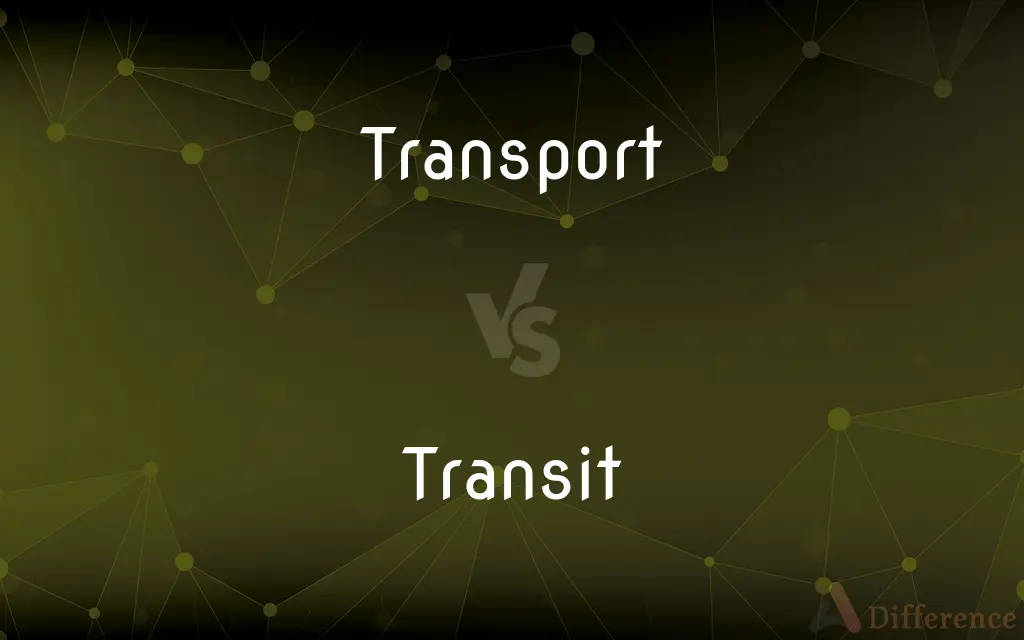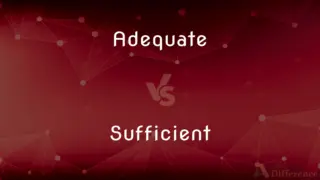Transport vs. Transit — What's the Difference?
By Fiza Rafique & Maham Liaqat — Updated on March 24, 2024
Transport involves the movement of goods or people from one place to another, while transit specifically refers to the passage of goods or people through a particular route or area.

Difference Between Transport and Transit
Table of Contents
ADVERTISEMENT
Key Differences
Transport is a broad term that encompasses all modes and methods of moving goods and people between locations, including by land, air, and sea. It involves logistics, vehicles, and infrastructure to facilitate movement. Transit, on the other hand, focuses more on the process of moving through a specific area or along a particular route, often within the context of public transportation systems or the shipping of goods through different jurisdictions.
While transport can refer to both personal and commercial movement, involving a variety of vehicles such as cars, trucks, ships, and airplanes, transit is more commonly associated with public transportation systems like buses, trains, and subways. Transit systems are designed to move large numbers of people efficiently through urban and suburban areas, emphasizing accessibility and scheduled services.
The scope of transport is wider, including the planning, execution, and management of moving goods or people, incorporating considerations like logistics, safety, and environmental impacts. Transit, while it can involve similar considerations, is typically more narrowly focused on the operational aspects of moving through predefined corridors or routes, often within a regulated service framework.
Transportation infrastructure plays a critical role in both concepts but in different ways. For transport, infrastructure includes roads, railways, ports, and airports—essentially, the physical and organizational structures needed for the operation of vehicles and movement systems. In the case of transit, the focus is on the facilities and services specifically designed to support public transportation, such as bus lanes, subway stations, and light rail systems.
Environmental impact is a consideration for both transport and transit, with ongoing efforts to reduce emissions and improve efficiency across modes of transport. However, transit systems, particularly those relying on electrification and renewable energy sources, are often highlighted as more sustainable options for reducing congestion and lowering the carbon footprint associated with urban transportation.
ADVERTISEMENT
Comparison Chart
Definition
Movement of goods or people between locations
Movement through a specific route or area
Association
Broad, includes personal and commercial movement
Often associated with public transportation systems
Scope
Wide, including logistics, vehicles, infrastructure
Narrower, focused on operational aspects in predefined corridors
Infrastructure
Roads, railways, ports, airports
Bus lanes, subway stations, light rail systems
Environmental Impact
Efforts to reduce emissions across all modes
Highlighted for sustainability in urban contexts
Compare with Definitions
Transport
The act of taking items from one location to another.
The company specializes in the transport of fragile goods across long distances.
Transit
Services for mass movement of people.
The city's transit system includes buses, subways, and trams.
Transport
The organization of detailed operations.
Effective transport logistics are crucial for international trade.
Transit
Organized public transport services.
The transit authority regulates fares and schedules for the subway system.
Transport
Systems and vehicles for moving people.
Urban areas require efficient public transport systems to reduce traffic congestion.
Transit
Designing cities for sustainable movement.
Transit-oriented development focuses on accessible public transport options.
Transport
Building the physical framework needed.
Investment in transport infrastructure boosts economic growth.
Transit
The effectiveness of movement services.
High operational efficiency is a hallmark of successful transit systems.
Transport
The impact of transportation on nature.
Sustainable transport solutions aim to minimize environmental damage.
Transit
Moving through specific routes or corridors.
Goods in transit through the canal reach their destination faster.
Transport
Transport (BE) or transportation (AE) is the movement of humans, animals, and goods from one location to another. In other words, the action of transport is defined as a particular movement of an organism or thing from a point A (a place in space) to a point B. Modes of transport include air, land (rail and road), water, cable, pipeline, and space.
Transit
The carrying of people or things from one place to another
A painting was damaged in transit
Transport
Take or carry (people or goods) from one place to another by means of a vehicle, aircraft, or ship
The bulk of freight traffic was transported by lorry
Transit
The action of passing through or across a place
Guatemala is to have freedom of transit across Belize
Transport
Overwhelm (someone) with a strong emotion, especially joy
She was transported with pleasure
Transit
Pass across or through (an area)
The new large ships will be too big to transit the Panama Canal
Transport
A system or means of conveying people or goods from place to place
Air transport
Many possess their own forms of transport
Transit
The act of passing over, across, or through; passage.
Transport
An overwhelmingly strong emotion
Art can send people into transports of delight
Transit
Conveyance of people or goods from one place to another, especially on a local public transportation system.
Transport
To move or carry (goods, for example) from one place to another; convey.
Transit
The system or vehicles used for such conveyance.
Transport
To cause to feel strong emotion, especially joy; carry away; enrapture.
Transit
The passage of a celestial body across the observer's meridian.
Transport
To send abroad to a penal colony; deport.
Transit
The passage of a smaller celestial body or its shadow across the disk of a larger celestial body.
Transport
The act of transporting; conveyance.
Transit
A surveying instrument similar to a theodolite that measures horizontal and vertical angles.
Transport
The condition of being transported by emotion; joy or rapture.
Transit
To pass over, across, or through
Aircraft transiting the United States and Canada.
Transport
A ship or aircraft used to transport troops or military equipment.
Transit
(Astronomy) To make a transit across (a celestial body as perceived by an observer), as a planet passing between the sun and Earth.
Transport
A vehicle, such as an aircraft, used to transport passengers, mail, or freight.
Transit
To revolve (the telescope of a surveying transit) about its horizontal transverse axis in order to reverse its direction.
Transport
The system of transporting passengers or goods in a particular country or area.
Transit
To make a transit.
Transport
The vehicles, such as buses and trains, used in such a system.
Transit
The act of passing over, across, or through something.
Transport
A deported convict.
Transit
The conveyance of people or goods from one place to another, especially on a public transportation system; the vehicles used for such conveyance.
The transit of goods through a country
Transport
To carry or bear from one place to another; to remove; to convey.
To transport goods; to transport troops
Transit
(astronomy) The passage of a celestial body across the observer's meridian, or across the disk of a larger celestial body.
Transport
(historical) To deport to a penal colony.
Transit
A surveying instrument rather like a theodolite that measures horizontal and vertical angles.
Transport
(figuratively) To move (someone) to strong emotion; to carry away.
Music transports the soul.
Transit
(navigation) An imaginary line between two objects whose positions are known. When the navigator sees one object directly in front of the other, the navigator knows that his position is on the transit.
Transport
An act of transporting; conveyance.
Transit
(British) A Ford Transit van, see Transit.
Beufort road, Birkenhead, about 17.15 June 19 2013, white transit overtakes and swerves left into junction almost taking my front wheel.
Transport
The state of being transported by emotion; rapture.
Transit
(North America) Public transport system.
I always take the transit to work.
Transport
A vehicle used to transport (passengers, mail, freight, troops etc.)
Transit
To pass over, across or through something.
Transport
(Canada) A tractor-trailer.
Transit
To convey people or goods from one place to another, especially by public transport vehicles.
Transport
The system of transporting passengers, etc. in a particular region; the vehicles used in such a system.
Transit
To revolve an instrument about its horizontal axis so as to reverse its direction.
Transport
A device that moves recording tape across the read/write heads of a tape recorder or video recorder etc.
Transit
To make a transit.
Transport
(historical) A deported convict.
Transit
(Internet) To carry communications traffic to and from a customer or another network on a compensation basis as opposed to peerage in which the traffic to and from another network is carried on an equivalency basis or without charge.
Transport
To carry or bear from one place to another; to remove; to convey; as, to transport goods; to transport troops.
Transit
The act of passing; passage through or over.
In France you are now . . . in the transit from one form of government to another.
Transport
To carry, or cause to be carried, into banishment, as a criminal; to banish.
Transit
The act or process of causing to pass; conveyance; as, the transit of goods through a country.
Transport
To carry away with vehement emotion, as joy, sorrow, complacency, anger, etc.; to ravish with pleasure or ecstasy; as, music transports the soul.
[They] laugh as if transported with some fitOf passion.
We shall then be transported with a nobler . . . wonder.
Transit
A line or route of passage or conveyance; as, the Nicaragua transit.
Transport
Transportation; carriage; conveyance.
The Romans . . . stipulated with the Carthaginians to furnish them with ships for transport and war.
Transit
The passage of a heavenly body over the meridian of a place, or through the field of a telescope.
Transport
A vessel employed for transporting, especially for carrying soldiers, warlike stores, or provisions, from one place to another, or to convey convicts to their destination; - called also transport ship, transport vessel.
Transit
An instrument resembling a theodolite, used by surveyors and engineers; - called also transit compass, and surveyor's transit.
Transport
Vehement emotion; passion; ecstasy; rapture.
With transport views the airy rule his own,And swells on an imaginary throne.
Say not, in transports of despair,That all your hopes are fled.
Transit
To pass over the disk of (a heavenly body).
Transport
A convict transported, or sentenced to exile.
Transit
A surveying instrument for measuring horizontal and vertical angles, consisting of a small telescope mounted on a tripod
Transport
Something that serves as a means of transportation
Transit
A facility consisting of the means and equipment necessary for the movement of passengers or goods
Transport
An exchange of molecules (and their kinetic energy and momentum) across the boundary between adjacent layers of a fluid or across cell membranes
Transit
A journey usually by ship;
The outward passage took 10 days
Transport
The commercial enterprise of transporting goods and materials
Transit
Make a passage or journey from one place to another
Transport
A state of being carried away by overwhelming emotion;
Listening to sweet music in a perfect rapture
Transit
Pass across (a sign or house of the zodiac) or pass across (the disk of a celestial body or the meridian of a place);
The comet will transit on September 11
Transport
A mechanism that transport magnetic tape across the read/write heads of a tape playback/recorder
Transit
Revolve (the telescope of a surveying transit) about its horizontal transverse axis in order to reverse its direction
Transport
Move something or somebody around; usually over long distances
Transit
Cause or enable to pass through;
The canal will transit hundreds of ships every day
Transport
Move while supporting, either in a vehicle or in one's hands or on one's body;
You must carry your camping gear
Carry the suitcases to the car
This train is carrying nuclear waste
These pipes carry waste water into the river
Transport
Hold spellbound
Transport
Transport commercially
Transport
Send from one person or place to another;
Transmit a message
Common Curiosities
Can the terms transport and transit be used interchangeably?
While related, they are not fully interchangeable as they emphasize different aspects of movement; transport is a broad term, whereas transit focuses on specific passages or systems.
What infrastructure is essential for transport?
Essential infrastructure includes roads, railways, ports, and airports to support various modes of transport.
How do transit systems contribute to urban sustainability?
Transit systems reduce reliance on personal vehicles, lower congestion, and can significantly decrease urban carbon footprints through efficient public transportation.
How does transport logistics affect international trade?
Efficient transport logistics are crucial for timely deliveries, cost management, and maintaining the integrity of goods in international trade.
What role does public transportation play in transit?
Public transportation is central to transit, providing scheduled services for moving people efficiently through urban and suburban areas.
Are there environmental benefits to choosing transit over personal vehicles?
Yes, using transit can significantly reduce individual carbon footprints, decrease traffic congestion, and improve air quality in urban environments.
How do urban planners use transit systems to design cities?
Urban planners integrate transit systems into city designs to promote accessibility, reduce car dependency, and support sustainable urban growth.
Why is operational efficiency important in transit systems?
Operational efficiency ensures that public transportation systems can move large numbers of people effectively, reducing wait times and improving reliability.
What is the difference between transport and transit?
Transport is the broader concept of moving goods or people, while transit specifically refers to the passage through particular routes or areas.
What are the challenges in developing effective transport systems?
Challenges include funding, coordinating logistics, infrastructure development, and addressing environmental concerns.
How do regulations impact transit systems?
Regulations ensure safety, set fares, and schedules, and guide the development and operation of public transportation systems.
What are examples of transit-oriented development?
Examples include residential and commercial areas designed around public transportation hubs to maximize access to transit services.
What makes a transit system successful?
A successful transit system is accessible, reliable, efficient, and meets the needs of the community it serves.
Can goods be in transit in a transport system?
Yes, goods can be described as in transit when they are being moved through specific routes or areas within the broader transport system.
How do transport and transit impact economic development?
Both are crucial for economic development, facilitating trade, enabling mobility, and supporting the growth of urban and rural areas.
Share Your Discovery

Previous Comparison
Afraid vs. Apprehensive
Next Comparison
Adequate vs. SufficientAuthor Spotlight
Written by
Fiza RafiqueFiza Rafique is a skilled content writer at AskDifference.com, where she meticulously refines and enhances written pieces. Drawing from her vast editorial expertise, Fiza ensures clarity, accuracy, and precision in every article. Passionate about language, she continually seeks to elevate the quality of content for readers worldwide.
Co-written by
Maham Liaqat













































